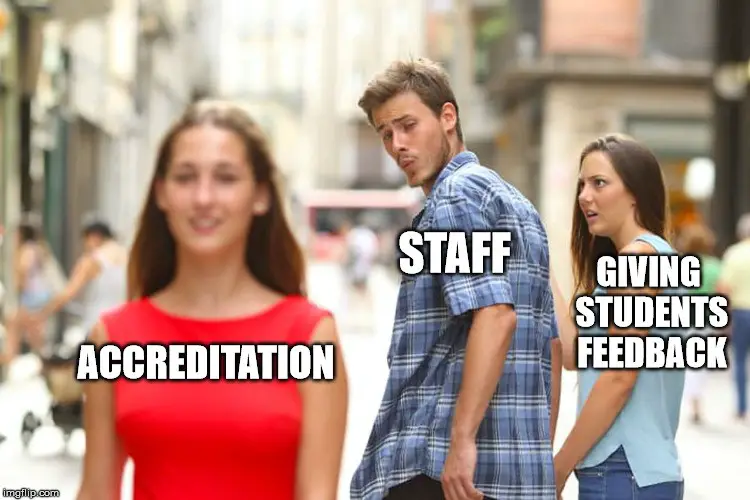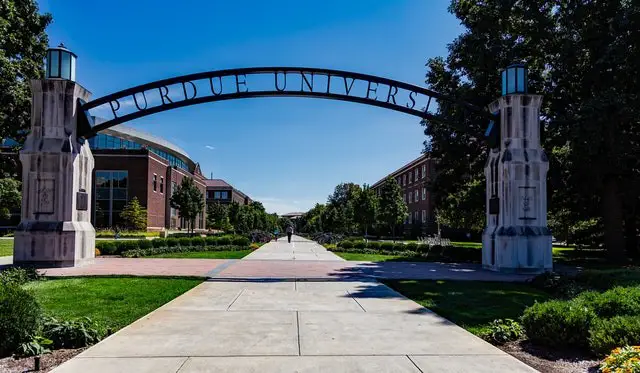What is Accreditation in Colleges and Universities?
Accreditation is a process where the higher learning institutions get evaluated on their education standards by a board of members from various universities and colleges. Learn the different steps, phases, types of accreditation, and more.
College Accreditation is the process by which the quality of learning at various educational institutions are evaluated by a board of members from various universities and colleges. Accreditation standards are established by a peer review board, whose members are representatives of already accredited institutions. The Peer Review Board functions to grant accreditation to unaccredited institutions and also to renew the accreditations of the already accredited institutions.
Criteria for assessment of the quality of education include the overall mission of the college, objectives, and goals, student requirements for admissions, service availability to students, quality of education, and reputation of the faculty.

source - imgflip.com
Why is Accreditation for Colleges important?
Choosing the best college is a wise decision a student can make for a bright career. Accreditation is the guarantee that the program of the institution has been verified by experts and is proven trustworthy and of a high standard, which is an indicator of a good investor. Moreover, accreditation is a quality assurance system across institutions in the United States.
The quality of an agency is ensured by the USDE, ABET, and the CHEA for institutional accrediting. USDE is the United States Department of Education, ABET is Accreditation Board for Engineering and Technology, Inc., and CHEA is the Council for Higher Education Accreditation. There are various USDE and CHEA recognized agencies that offer accreditations for a variety of programs. Furthermore only accredited institutions can take part in the financial aid programs and offer employer tuition assistance.
The credit transfers of students happen only in an accredited environment. Employers search for prospective employees from an accredited institution. Students are eligible to sit for the certification exam only if they are from an accredited institution.

What are the types of Accreditation?
The type of accreditation for colleges is dependent on the type of academic program or educational institution. Some of the educational institutions that can be accredited are:
-
Public universities
-
Private universities
-
For-profit universities
-
Nonprofit universities
-
Single-purpose institutions
-
Private career training institutions
-
Faith-based universities
-
Distance learning universities
-
Law schools
-
Medical schools
-
Health professions education programs
You may also read: What are Public Colleges?
How to afford a Private University?
The three agencies that monitor the quality of the educational institutes and are used for assessment and assurance are :
Regional Accreditation Organizations
The pioneers of regional accreditation of educational institutions were a group of conventional colleges and universities in particular regions of the U.S. These organizations accredit and monitor post-secondary institutions at the regional level in the United States. Accreditation by a regional organization to an educational institution applies to the entire institution but does not cater to the quality of individual programs that college/university offers.
The most common regional accreditors are :
-
New England Association of Schools and Colleges, Commission on Institutions of Higher Education (NEASC-CIHE)
-
Middle States Association of Schools and Colleges (MSA), Commission on Higher Education
-
Western Association of Schools and Colleges, Accrediting Commission for Senior Colleges and Universities (WASC-ACSCU)
-
North Central Association of Colleges and Schools, The Higher Learning Commission (NCA-HLC)
-
New England Association of Schools and Colleges, Commission on Technical and Career Institutions (NEASC-CTCI)
-
Western Association of Schools and Colleges, Accrediting Commission for Community and Junior Colleges (WASC-ACCJC)
-
Southern Association of Colleges and Schools (SACS), Commission on Colleges
Regional accreditation organizations accredit a major share of non-profit and public higher education institutions in the nation.
You may also read - New England Commission Higher Education (NEASC)
WASC Senior College and University Commission (WSCUC)
Southern Association of Colleges and Schools Commission Colleges (SACS)
National Accreditation Organizations
These college accreditation organizations employ nation-wide operations and accredit educational institutions as a whole. National accrediting organizations cater to the interests of institutions that were not originally founded as colleges or universities. There are two types of national organizations-faith-based and career-focused.
Faith-based or doctrinally based accreditors only hold a meager portion of national organizations. On the contrary, career-focused accreditors benefit a larger portion of educational institutions (like single-purpose institutions).
Specialized/Professional Accrediting Organizations
Specialized, professional, or programmatic accreditation benefits specific sections of a department, school, program, or college's academics such as nursing, education, engineering, or the law. These organizations function across the United States, monitoring and reviewing different programs and single-purpose institutions.
You may also read - Regional vs National Accreditation
What are the phases is Accreditation?
There are different types of accreditation that can be granted to an institution. They are given below.
-
Provisional Accreditation - This is granted to an institution if its resource allocation is implemented as planned, and holds provisional status to perform with continued quality. Provisional accreditation is valid only until accreditation continued is achieved.
-
Continued Accreditation - When a currently accredited program performs in compliance with the standards, then this is achieved. Until the program closes or withdraws from the accreditation standards, this continued status remains in effect.
-
Clinical Postgraduate Program Accreditation - When a newly introduced clinical accreditation program is in compliance with the Standards of the Clinical Postgraduate Program Accreditation, then the program is eligible to attain the Clinical Postgraduate program.
-
Probation Accreditation - Temporary accreditation which is limited to two years is offered when the quality of the program offered is a doubt. If the quality of the program doesn’t improve even after being placed in the probation category, the accrediting commission is provided all rights to remove the accreditation of the program.
-
Administrative Probation Accreditation - When the administrative standards of the institution such as fee-payments, report submission, and more are not met, then the institution is granted administrative probation accreditation.
-
Accreditation Withheld - Even after the probation accreditation, the standards of the institution are not met then the accreditation of the institution/program is withheld and is placed in the withheld phase.
-
Voluntary Inactive status - Programs that cease instruction is placed under the Voluntary Inactive Status.
Accreditation status of an institution/program
To check if an institution (online/offline) is accredited you can cross-check it the United States Department of Education.
-
An easy and customized search is available at the US Department of Education Website. Students can search via institution name or check from the list drops down.
-
Checking the six main regional accrediting agencies including Middle State Association of Colleges and Schools, North Central Association of Colleges and Schools, Northwest Commission on Colleges and Universities, Southern Association of Colleges and Schools, Western Association of Colleges and Schools, and, New England Association of Colleges and Schools can provide further insights.
-
The community college or junior college can be contacted directly.
 source - pexels.com
source - pexels.com
What are the steps for accreditation?
The process of accreditation of an educational institute involves the following steps:
-
Peer scrutiny
After the submission of paperwork to the accreditation agency, faculty and administrative peers scrutinize the reports, prepared materials, and general workings of the institution seeking accreditation.
-
Jury visit
The accreditation agency sends a jury team (professionals) to monitor and inspect the accreditation seeking institute. The jury comprises of peers and public volunteers who commit to examining the standards of education of a college/ university.
-
Decision process
The jury team collects all the necessary information during the institution visit. This information is reviewed, hence, being instrumental in deciding the accreditation status for the educational institution under scrutiny.
-
Accreditation renewal review
After being awarded the status of accreditation, the educational institution commits to adhere to the standards set by the accreditation organization. The accredited institution also commits to undergo periodical accreditation renewal review.
What if an institution is unaccredited?
An unaccredited institution is not eligible for financial aid. The required quality of education is also not maintained. Credits aren’t offered in the right way. You get credits for very low-quality work. An unaccredited institution has a name that is more similar to a well-known college or university.
Before applying to any university make sure that you have verified the national accreditation of the course. Also, make sure that the accrediting agency is also recognized.
If the institution loses accreditation in the middle of your course, then you might stop receiving your federal aid thereafter.
As credit transfer from an unaccredited institution is hard, students might also find it difficult to seek another admission.
Be hopeful if your institution has lost its accreditation after you have started your course. You’ll still be viewed as a graduate from an accredited institution.
However, you might not get your college fee refunded if the college has lost its accreditation.
It's a student’s freedom to sue an institution for losing its accreditation. Though there were successful cases, it is not advised to proceed against the institution in the court.
Conclusion
Accreditation of educational institutions is a vital process for it ensures the quality and maintenance of the education and relevant processes. Students are advised to ensure the accreditation status of the educational institution before enrollment to prevent uninvited consequences.